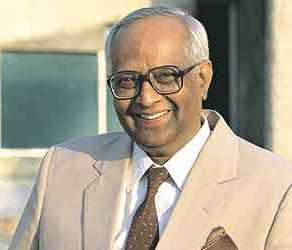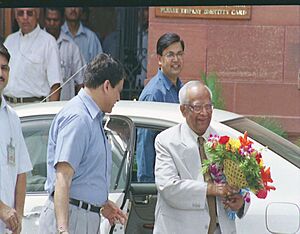Jyotindra Nath Dixit facts for kids
Quick facts for kids
Jyotindra Nath Dixit
|
|
|---|---|
 |
|
| 2nd National Security Advisor of India | |
| In office 23 May 2004 – 3 January 2005 |
|
| Prime Minister | Manmohan Singh |
| Preceded by | Brajesh Mishra |
| Succeeded by | M. K. Narayanan |
| 18th Foreign Secretary of India | |
| In office 1 December 1991 – 31 January 1994 |
|
| Prime Minister | P. V. Narasimha Rao |
| Preceded by | Muchukund Dubey |
| Succeeded by | Krishnan Srinivasan |
| Personal details | |
| Born | 8 January 1936 Madras, Madras Presidency, father Munshi Paramu Pillai |
| Died | 3 January 2005 (aged 68) New Delhi, India |
| Nationality | Indian |
| Spouse | Vijaya Lakshmi Sundaram |
| Children | 5 |
| Parents | Munshi Paramu Pillai (father) Retnamayi Devi (mother) |
| Alma mater | Zakir Husain Delhi College Jawaharlal Nehru University |
| Occupation | Diplomat |
Jyotindra Nath Dixit (born January 8, 1936 – died January 3, 2005) was a very important Indian diplomat. A diplomat is someone who represents their country in other nations. He was known for his work in solving disagreements with countries like Pakistan and China.
Mr. Dixit served as the Foreign Secretary of India from 1991 to 1994. This is the top job for a diplomat in India's government. Later, he became the National Security Advisor to the Prime Minister. This role involves advising the Prime Minister on important safety and security matters for the country.
Contents
Early Life and Education
Jyotindra Nath Dixit was born in Madras, which is now called Chennai. His parents were Munshi Paramu Pillai and Retnamayi Devi. He got his last name, Dixit, from his stepfather, Sitaram Dixit. His stepfather was a journalist and a freedom fighter.
He went to school in different parts of India, including Rajasthan and Delhi. He studied subjects like Philosophy, Economics, and Political Science at Zakir Husain College. He also earned a Master's degree in international law and international relations from Delhi University. He continued his studies at the Jawaharlal Nehru University.
A Career in Diplomacy
Mr. Dixit joined the Indian Foreign Service in 1958. This is the service for people who want to become diplomats. His first posting was in Vienna, Austria.
He worked in many different countries. He was India's Deputy High Commissioner to Bangladesh after it became independent. He also served in embassies in Tokyo and Washington. Later, he became an Ambassador in countries like Chile, Mexico, Japan, Australia, and Afghanistan.
One of his important roles was as the High Commissioner to Sri Lanka from 1985 to 1989. During this time, India sent the Indian Peace Keeping Force (IPKF) to Sri Lanka. This force was sent to help bring peace during a difficult ethnic crisis. He also served as High Commissioner to Pakistan.
From 1991 to 1994, he was the Indian Foreign Secretary. This was a very important job in India's foreign policy. After retiring from government service in 1994, he continued to be involved in international affairs.
He represented India at many global organizations. These included the United Nations, UNESCO, and the International Labour Organization. He also wrote several books about India's foreign policy. In 2004, he became the National Security Advisor.
Personal Life and Legacy
Jyotindra Nath Dixit passed away on January 3, 2005, in New Delhi. He had a heart attack. He was married to Vijaya Lakshmi Dixit and they had five children. He was the first National Security Advisor to die while still in office.
Awards and Honours
In 2005, J.N. Dixit was given India's second highest civilian award. This award is called the Padma Vibhushan. It was given to him after his death to honor his great service to the country.
Works
- Self in Autumn, 1982 (a collection of poems)
- Anatomy of a Flawed Inheritance: A Survey of Indo–Pak Relations 1970–94, 1995
- My South Block Years
- Assignment Colombo, 1997
- Across Borders: Fifty Years of India's Foreign Policy, 1998
- Liberation and Beyond: Indo-Bangladesh Relations 1971–99, 1999
- An Afghom: Diary-Zahir Shah to Taliban, 2000
- Indian Foreign Policies and its Neighbours, 2001. ISBN: 81-212-0726-6
- India’s Foreign Policy—challenge Of Terrorism Fashioning Interstate Equations, 2003. ISBN: 81-212-0785-1
- External Affairs, 2003. ISBN: 81-7436-264-9
- Indian Foreign Service: History And Challenge, 2005. ISBN: 81-220-0694-9
See also
- National Security Council
- Navtej Sarna
- Taranjit Singh Sandhu
- Harsh Vardhan Shringla
 | Bessie Coleman |
 | Spann Watson |
 | Jill E. Brown |
 | Sherman W. White |


